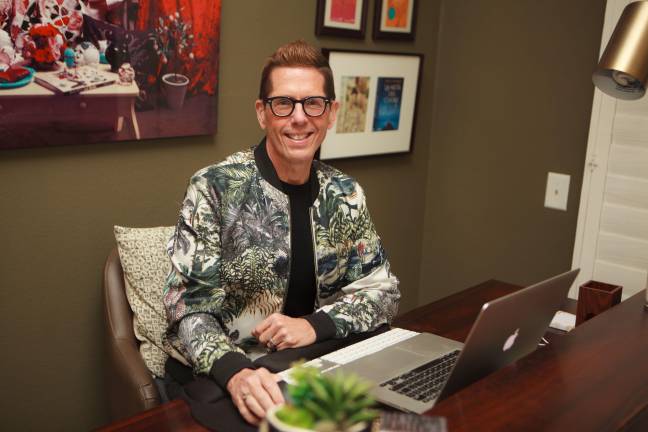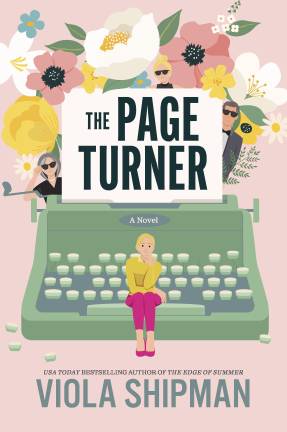In The Page Turner, Emma Page is living every novelist’s dream.
The recent grad, with a manuscript under her arm, rolls into NYC, where her social-climbing parents own a small press in SoHo, and her sister is a powerful Influencer.
Presumably, the former will publish her book, then the latter will promote it until it’s a best-seller.
But Philip and Piper Page look down on their daughter’s genre of choice: romance. Jess thinks her younger sibling is unsophisticated and unworthy of the success her 2 million followers would guarantee.
That’s the “real world” Emma’s relatives keep saying she needs to start living in.
The only world Emma wants to occupy is the one created by her late, independent, down-to-earth grandmother, GiGi aka Pauline Page, beloved for her common-sense Michigan wisdom.
Nothing, however, brings feuding family members together like a common enemy, especially one who’s trying to home in on their livelihood and destroy GiGi’s trailblazing legacy.
The novel does more, though, than depict a publishing family’s struggles.
According to Shipman: “The Page Turner is a novel about how books save us.”
Straus Media sat down with Viola Shipman, the pen name for Wade Rouse, the best-selling author of five memoirs and 12 novels.
The real Viola Shipman was Wade’s grandmother, whose unconditional love and support encouraged him to become a writer.
What inspired The Page Turner?
My grandmother was a dirt-poor seamstress from the Ozarks in Missouri, where I spent my childhood. She never finished high school. I got to thinking about how, as a woman in that era with no money and no power, her voice was never heard. But I listened.
And that is what started the whole idea of The Page Turner. From there, I wanted to answer a bigger question in life: Can this young woman, Emma, find the strength of her own voice to tell her own story? That’s all any of us can do in this world.
Women’s fiction is often reduced to being “chick lit” or “beach reads” as though the genre doesn’t have value or a message or that it’s not well written. Why do these books have to be trivialized to sell?
It’s a marketing thing, and it drives me crazy.
[Women’s fiction] is deeper-themed about the issues that are facing not only women but all of us: issues that are central to our lives. It’s family and friendship, finding respect, and finding our voice in this world. Those things are universal.
The Page Turner gives a behind-the-scenes look at publishing. Is it a send-up or a tribute?
I would check-mark both.
I wanted to peel back the curtain for people to understand what it’s like to get attention for a book.
I really respect what my publisher does, and I know how difficult it is, but there is an incredible craziness to trying to break out in a world where things are stacked against authors who have to get their own press and build their own brand to sell their own books.
How do the female characters in The Page Turner break the mold?
Emma is a young woman writing about romance, but I intentionally did not want her to have romance in her life. I wanted her to fall in love with herself because that’s what my grandma told me to do.
I was a gay kid in the Ozarks in the 1970s. I had a target on my back, and my grandmother said, “Love yourself and that’ll strengthen you enough to withstand anything.” I wanted Emma to stand on her own, which is very different from many popular books today, where having the woman fall in love with a man is central to the story.
I also took a different perspective on mother/daughter relationships.
Let’s talk about Marcus Flare, the antagonist.
He’s based on the male figure that is ever-present today. People definitely want these types to get their due, but [the Marcus Flares] get away with things. It’s not right, but it’s the way it is.
You say books saved you. How?
A book is a walk in someone else’s shoes. It takes you on a journey, like traveling. Books make you open your mind. They connect us deeply.
I didn’t even know the word “gay” growing up. Books and stories helped me see myself reflected. I began to understand that there was a world out there, much bigger than the small one in which I existed, that was going to be accepting of me as I was. It gave me hope.
Those are the types of books that I write today.
There are people out there who haven’t read a book in years. Tell them what they’re missing.
Get thee to a bookstore or library immediately and pick up anything. I mean, anything. My grandmother used to tell me that besides reading a book, the best thing you can do is shut up and listen. A book just makes you shut up and listen to someone else’s story.
Your book is a tribute to family history. What are the benefits of people taking more of an interest in their own family’s history?
I truly believe you don’t know where you’re going if you don’t know where you came from.
Sometimes, we see our elders as just old people. We’re missing out on a huge piece of not only our history but also incredible advice.
Seeing someone on the surface is like just looking at a book cover. You have to get to know what’s inside. And that’s the heart of The Page Turner.
Lorraine Duffy Merkl is the author of three novels, most recently The Last Single Woman in New York City.
“My grandmother used to tell me that besides reading a book, the best thing you can do is shut up and listen. A book just makes you shut up and listen to someone else’s story.” —Viola Shipman

